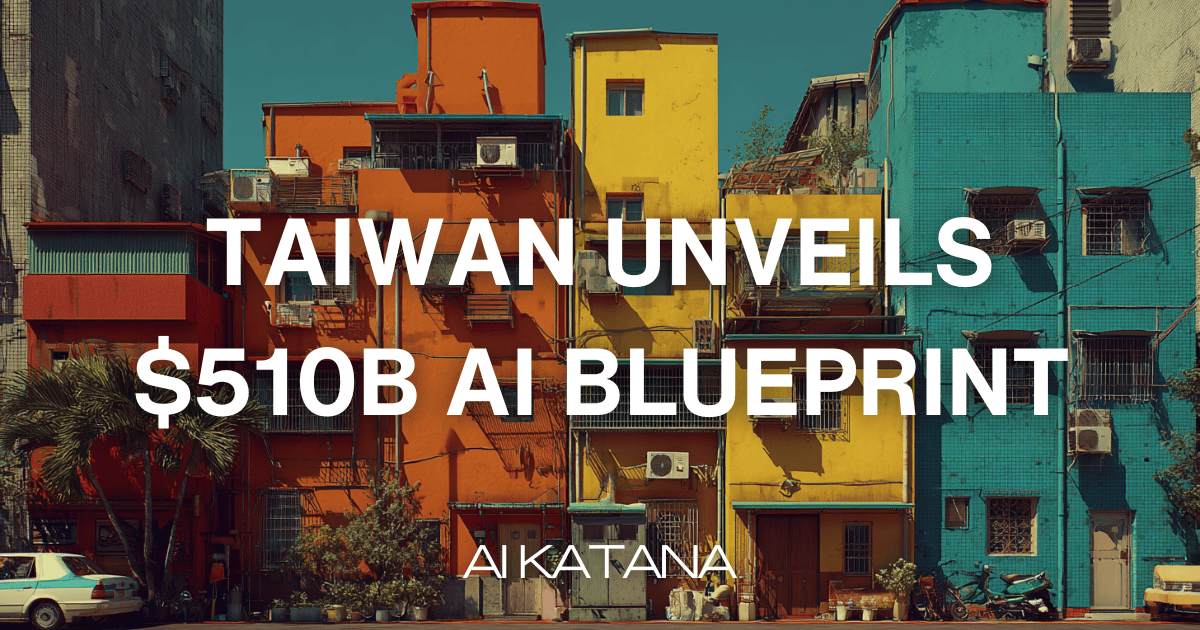- AI KATANA
- Posts
- Taiwan Unveils $510B AI Blueprint
Taiwan Unveils $510B AI Blueprint
Also: AI Capex Props Up US GDP

Hello!
Global AI momentum accelerated overnight as Taiwan unveiled a ₤15 trillion (US $510 billion) “Ten Major AI Infrastructure Projects” that marshal its chip champions and venture capital to add six percentage points to GDP, while Washington pivoted to a growth-first national AI Action Plan pairing fast-track datacentre permits with generous tax incentives; the capital rush is already straining America’s power grid, where PJM capacity prices set fresh records, and rippling through corporate strategy as McKinsey curtails mainland China GenAI work and Beijing doubles down on open-source robotics to out-iterate proprietary rivals. On the earnings front, ServiceNow beat expectations and raised guidance on surging GenAI workflow demand, and economists now attribute more than a third of projected U.S. GDP growth to AI-driven capex, underscoring the sector’s new role as an engine of industrial reinvestment.
Sliced just for you:
🌏 Taiwan Unveils $510B AI Blueprint
🏛️ White House Rolls Out Growth-First AI Action Plan
⚡ AI Boom Sparks Record US Grid Costs
🏢 McKinsey Halts China GenAI Work
🤖 China Leans on Open-Source Robots
📈 ServiceNow Lifts Outlook on AI Demand
💹 AI Capex Props Up US GDP
Taipei has launched its “Ten Major AI Infrastructure Projects,” a sweeping program that taps Taiwan’s semiconductor ecosystem to generate more than T$15 trillion (US $510 billion) in value by 2040. Three thrusts—silicon photonics, quantum tech and AI robotics—anchor the plan, with TSMC supporting new photonics fabs and Foxconn chair Young Liu spearheading a national robotics alliance. Government will seed T$100 billion in venture capital, establish three world-class labs, and aims to create 500,000 specialist jobs. Premier Cho Jung-tai framed the initiative as the island’s path to becoming “the Switzerland of advanced compute,” promising export-ready sovereign AI models and regional innovation hubs to lift smaller cities. Lawmakers have fast-tracked enabling tax incentives, and the economics ministry forecasts private-sector co-investment to triple public outlays within five years. If targets hold, Taiwan’s GDP would see a 6 percentage-point uplift.
The White House has released a 24-page AI Action Plan that pivots national policy from risk-first restraint to growth-first acceleration. The blueprint orders every federal agency to repeal rules that slow commercial deployment and sets up a “Permit Fast-Lane” for hyperscale datacentres. A US $50 billion loan-guarantee pool will underwrite U.S. chip fabs, and export curbs on high-end GPUs will be eased for close allies. New tax credits let companies offset 40 % of training-compute costs if they build onshore, and states that keep liability laws light will receive priority infrastructure grants. Critics warn the package scraps key bias-testing safeguards, but backers argue it reasserts American leadership amid an intensifying compute race, adding 420 000 jobs and US $1 trillion to GDP over five years. The plan will be steered by a Cabinet-level AI Competitiveness Council.
Capacity prices on PJM Interconnection, America’s largest power market, have surged to an all-time high $16.1 billion as data-center growth for AI accelerates. Bloomberg calculates that generative-AI workloads could double regional electricity demand by 2030, forcing utilities to green-light new gas-fired plants despite decarbonisation pledges. Analysts say hyperscalers led by Microsoft and Amazon quietly pre-bought five gigawatts of capacity in this year’s auction, bidding up costs that will filter to households next summer. Developers eye federal tax credits to pair peaker plants with battery storage, yet environmental groups warn the scramble may lock in fossil assets for two decades. Regulators are reviewing PJM’s queue to prioritise zero-carbon projects, but industry lobbyists argue permitting timelines are incompatible with AI’s break-neck compute growth.
Under mounting U.S. scrutiny, McKinsey has barred its mainland China consultants from generative-AI engagements—even for multinational clients—while allowing legacy AI analytics. The firm cut regional head-count from 1,500 to about 1,000 and is funnelling GenAI requests to teams in Singapore and Dubai instead. Executives told the Financial Times the policy reflects Washington’s concerns over AI and quantum tech knowledge transfer. Chinese corporates are already pivoting to cheaper domestic consultancies, squeezing McKinsey’s pipeline just as QuantumBlack advertises “borderless AI” expertise globally. Rivals BCG and Bain still accept limited GenAI mandates in China but are tightening client due-diligence. Analysts view the retreat as a bell-wether for professional-services decoupling in advanced tech.
A Fortune Asia deep-dive reports that after January’s “DeepSeek shock,” Beijing is accelerating open-source robotics to out-iterate U.S. closed platforms. Government labs in Shenzhen and Tianjin are pooling code under the new Brainstorm-AI consortium, hoping to leapfrog proprietary humanoids with swarm-learning and locally trained vision models tied to Huawei Ascend chips. Early pilots show 30 % faster pick-and-place cycles versus imported arms, while venture funds are courting Singapore logistics hubs to showcase cross-border deployments. Analysts say the strategy mirrors China’s LLM push: commoditise baseline models, then differentiate on hardware integration.
ServiceNow raised its 2025 subscription-revenue forecast to as high as $12.80 billion after posting better-than-expected Q2 numbers, crediting brisk uptake of its GenAI workflow copilots. The platform signed six new U.S. public-sector customers despite lingering budget caps, and CEO Bill McDermott said its pending $2.85 billion Moveworks buy will close by early 2026. Shares jumped 7 % in late trading, underscoring investor conviction that AI-driven automation budgets are proving recession-resilient. The firm acknowledged that a cluster of large renewals in Q4 could temporarily dent backlog metrics, yet analysts highlighted 200-basis-point upside to current RPO next year once renewals clear.
A Reuters Breakingviews column argues that surging AI-related capital expenditure—led by data-center build-outs and GPU purchases—now explains more than a third of projected Q2 U.S. GDP growth. Carlyle strategists calculate infrastructure spend has quadrupled since 2020, while Morgan Stanley sees a $2.9 trillion global data-center bill through 2028, including a $1.5 trillion financing gap. The piece posits the frenzy is an “effective re-industrialisation” of America, redirecting investment from software to concrete and kilowatts. Sustaining momentum, however, may require ever-cheaper debt markets and accelerated grid upgrades—risks policymakers have yet to confront.
🛠️ AI tools updates
Historians are hailing Aeneas, a new DeepMind model that predicts where battered Latin inscriptions were carved and fills missing words with startling accuracy. Trained on 200 000 texts, the system dates artefacts to within 13 years and links them to 62 Roman provinces, cutting scholarly research time in half. Early trials delivered helpful context in 90 % of cases, and the freely available tool blends multimodal vision-language encoding with graph analytics that map stylistic drift over centuries—offering a transparent alternative to black-box heritage tech.
GitHub has opened public preview of “Spark,” a no-code AI app builder for Copilot Pro Plus subscribers. Developers describe the desired workflow in plain English; Spark, backed by Anthropic’s Claude Sonnet 4, scaffolds a full-stack app, wiring data sources and deployment without manual cloud setup. The Verge notes Spark targets makers who outgrow ChatGPT snippets but lack infra expertise, positioning GitHub against Retool and Amplify. Enterprise SSO, policy guardrails and extensibility via Copilot agents are slated for GA later this year.
💵 Venture Capital updates
Security-compliance platform Vanta locked in a $150 million Series D led by Wellington Management, vaulting its valuation 69 % to $4.15 billion. CrowdStrike Ventures and Atlassian Ventures joined the round, citing Vanta’s new AI agent that trims third-party security reviews by 81 %. Now serving 12,000 clients across 58 countries, the firm will use proceeds to expand real-time monitoring and open a Sydney R&D hub to tap APAC demand.
Salt-Lake-City-based Scrunch AI raised $15 million from Decibel and Mayfield to help brands track how they surface in AI-driven search results—“SEO for agents.” The SaaS platform audits query responses across ChatGPT, Gemini and voice assistants, then suggests content tweaks that lift “answer box” share. Funds will grow the LLM-testing lab and expand into Asia, where WeChat Search integrations are already in pilot.
🫡 Meme of the day

⭐️ Generative AI image of the day

Before you go, check out how to transform your photos into videos and remix your pics in Google Photos.
